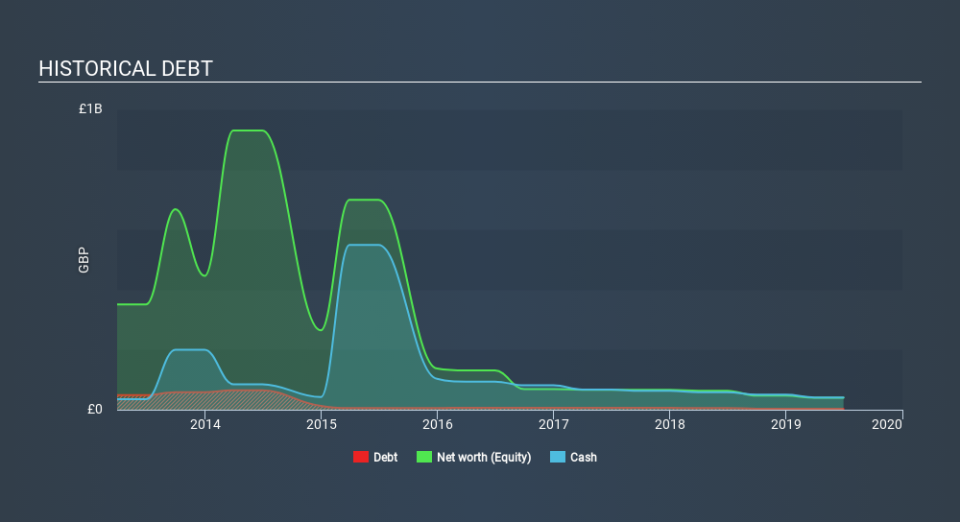Is Watchstone Group (LON:WTG) A Risky Investment?

Howard Marks put it nicely when he said that, rather than worrying about share price volatility, 'The possibility of permanent loss is the risk I worry about... and every practical investor I know worries about. So it seems the smart money knows that debt - which is usually involved in bankruptcies - is a very important factor, when you assess how risky a company is. We note that Watchstone Group plc (LON:WTG) does have debt on its balance sheet. But the more important question is: how much risk is that debt creating?
When Is Debt A Problem?
Debt assists a business until the business has trouble paying it off, either with new capital or with free cash flow. Part and parcel of capitalism is the process of 'creative destruction' where failed businesses are mercilessly liquidated by their bankers. However, a more common (but still painful) scenario is that it has to raise new equity capital at a low price, thus permanently diluting shareholders. Of course, debt can be an important tool in businesses, particularly capital heavy businesses. When we examine debt levels, we first consider both cash and debt levels, together.
Check out our latest analysis for Watchstone Group
What Is Watchstone Group's Net Debt?
The image below, which you can click on for greater detail, shows that Watchstone Group had debt of UK£2.82m at the end of June 2019, a reduction from UK£5.46m over a year. However, its balance sheet shows it holds UK£41.1m in cash, so it actually has UK£38.3m net cash.
A Look At Watchstone Group's Liabilities
Zooming in on the latest balance sheet data, we can see that Watchstone Group had liabilities of UK£22.5m due within 12 months and liabilities of UK£12.7m due beyond that. Offsetting these obligations, it had cash of UK£41.1m as well as receivables valued at UK£4.25m due within 12 months. So it actually has UK£10.1m more liquid assets than total liabilities.
This excess liquidity suggests that Watchstone Group is taking a careful approach to debt. Given it has easily adequate short term liquidity, we don't think it will have any issues with its lenders. Simply put, the fact that Watchstone Group has more cash than debt is arguably a good indication that it can manage its debt safely.
It was also good to see that despite losing money on the EBIT line last year, Watchstone Group turned things around in the last 12 months, delivering and EBIT of UK£1.7m. There's no doubt that we learn most about debt from the balance sheet. But it is Watchstone Group's earnings that will influence how the balance sheet holds up in the future. So when considering debt, it's definitely worth looking at the earnings trend. Click here for an interactive snapshot.
Finally, a company can only pay off debt with cold hard cash, not accounting profits. Watchstone Group may have net cash on the balance sheet, but it is still interesting to look at how well the business converts its earnings before interest and tax (EBIT) to free cash flow, because that will influence both its need for, and its capacity to manage debt. Over the last year, Watchstone Group saw substantial negative free cash flow, in total. While investors are no doubt expecting a reversal of that situation in due course, it clearly does mean its use of debt is more risky.
Summing up
While we empathize with investors who find debt concerning, you should keep in mind that Watchstone Group has net cash of UK£38.3m, as well as more liquid assets than liabilities. So we don't have any problem with Watchstone Group's use of debt. The balance sheet is clearly the area to focus on when you are analysing debt. However, not all investment risk resides within the balance sheet - far from it. To that end, you should be aware of the 2 warning signs we've spotted with Watchstone Group .
At the end of the day, it's often better to focus on companies that are free from net debt. You can access our special list of such companies (all with a track record of profit growth). It's free.
If you spot an error that warrants correction, please contact the editor at editorial-team@simplywallst.com. This article by Simply Wall St is general in nature. It does not constitute a recommendation to buy or sell any stock, and does not take account of your objectives, or your financial situation. Simply Wall St has no position in the stocks mentioned.
We aim to bring you long-term focused research analysis driven by fundamental data. Note that our analysis may not factor in the latest price-sensitive company announcements or qualitative material. Thank you for reading.

